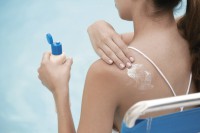
Do you think that maintaining good grooming while you’re going through cancer treatment is a luxury? Caring for your appearance is a great way to lift your spirits from the outside in.
Personal Care Tips for Cancer Patients
- Are you too tired or weak to get out of bed? Keep a portable mirror and grooming supplies in your nightstand.
- Shave with an electric razor to avoid nicks and cuts that may become infected.
- Brush your teeth and floss as usual, but consult your healthcare team before scheduling cleanings or other dental procedures.
- Hair loss is a frequent side effect of cancer treatment. Opt for whatever solution makes you feel best, whether it’s wearing wigs and scarves or shaving your head.
- Wear rubber or latex gloves during household chores to prevent contact with harsh soaps and chemical cleaning products.
- Make sure manicuring tools are clean before using. Instead of cutting cuticles, simply push them back gently. Keep nails short to prevent them from catching on things.
- Treat yourself to a relaxing spa session. Talk to your doctor beforehand if you’re planning a manicure, pedicure or waxing. Artificial or glue-on nails are usually restricted during cancer treatment.
- Exercise daily at whatever level feels comfortable. Not only does exercise benefit you physically, it relieves depression and anxiety. Yoga is a good choice that promotes harmony between mind and body.
Personalized Immunotherapy Treatment at Issels®
No matter what form of cancer you have, your case is unique. Contact us to learn how we tailor your specific treatment program to address your individual needs.




